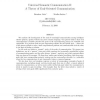Free Online Productivity Tools
i2Speak
i2Symbol
i2OCR
iTex2Img
iWeb2Print
iWeb2Shot
i2Type
iPdf2Split
iPdf2Merge
i2Bopomofo
i2Arabic
i2Style
i2Image
i2PDF
iLatex2Rtf
Sci2ools
ECCC
2008
2008
Universal Semantic Communication II: A Theory of Goal-Oriented Communication
We continue the investigation of the task of meaningful communication among intelligent entities (players, agents) without any prior common language. Our generic thesis is that such communication is feasible provided the goals of the communicating players are verifiable and compatible. In a previous work we gave supporting evidence for one specific goal -- where one of the players wished to solve a hard computational problem and communicated with the other in the hope of finding a solution. In this work we initiate a "generic" study of the goals of communication. We present two definitions: one of a "generic" meta-goal, which captures the (potentially unrealizable) wishes of communicating agents, and the other being a "generic" syntactic goal, which captures effects that can observed by an agent. We then show, under some technical conditions, that those metagoals that have corresponding syntactic versions are also universally achievable, i.e., achievable ...
| Added | 10 Dec 2010 |
| Updated | 10 Dec 2010 |
| Type | Journal |
| Year | 2008 |
| Where | ECCC |
| Authors | Brendan Juba, Madhu Sudan |
Comments (0)

